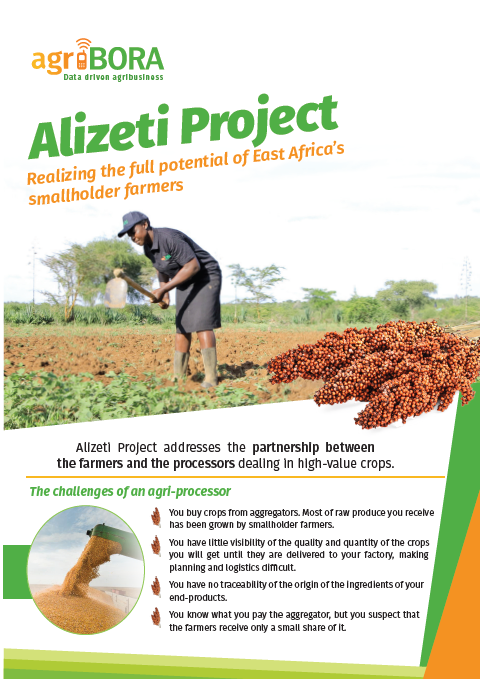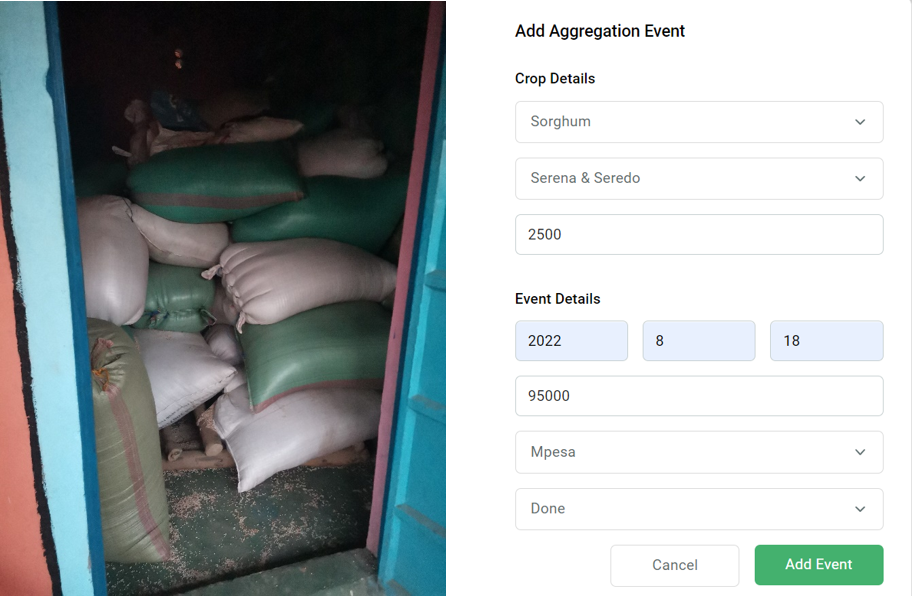
Objectives of the service

The Alizeti project aimed to address the challenges faced by small-scale farmers and agri-processors in Kenya. For agri-processors, the project aimed to address the lack of visibility, traceability, and transparency in the supply chain by using remote sensing technology to provide better visibility of the expected harvest and improved traceability of the crops they purchase. The project also aimed to provide smallholder farmers with better access to information and advice throughout the growing season to address their challenges of poor market linkage, high risk of failure, and lack of trust.
To achieve these goals, Alizeti developed a web platform that connects smallholder farmers with agri-processors to facilitate the procurement of high-value crops. The platform provides personalized dashboards for each agri-processor client, allowing them to monitor crop growth and yields. Farmers who produce the associated crops registered on the platform and receive advisory services, localized weather forecasts, and price indications.
The project aimed to increase transparency in the supply chain by demonstrating electronic payments to the farmers being made via the platform. Success stories were planned to be showcased to further agri-processors and farmer organizations, and a list of potential new agri-processor clients was created, covering all high-value crop types.
Users and their needs
The users of the services developed and demonstrated in the Alizeti project are smallholder farmers in Kenya and the agri-processors who purchase and further process their crops.
The agri-processors have three main problems.
-
Lack of Visibility – severe problems in crop monitoring and yield estimation during the crop growing stages, making planning of their businesses very difficult.
-
Lack of Traceability - limited visibility and traceability of raw materials making the supply chain inefficient. In addition, tax benefits are available in Kenya for purchasing locally-produced crops and agri-processors have difficulty proving this.
-
Lack of Transparency – the inability to engage directly with scattered smallholder farmers and the reliance on aggregators who offer low prices to farmers leads to lack of predictability and trust.
This lack of trust in a highly fragmented market is a problem for the smallholder farmers too. In addition, they have the problem of poor market linkage (revenue risks related to lack of market or low farmgate prices) and a high risk of failure (production risks related to weather uncertainty or limited access to sound advice).
Service/ system concept
The Alizeti project enhances the agriBORA platform that aims to connect smallholder farmers in Kenya with agri-processors to facilitate the procurement of high-value crops. The platform has a front-end dashboard, which is custom-built for each individual user (agri-processor) and a back-end, which is responsible for the functionalities, features, and services available. During the project, several existing features of the platform were enhanced using Metoblue weather data, including updating farmer data and subscription to agro weather advisories. In addition, new features were developed that allow for the updating of farmer, farm, and crop profiles, viewing of timelines for placing input orders, monitoring crop development, and estimating expected yield. These new features were designed to provide agri-processors with better visibility of the expected harvest and improved traceability of the crops they purchase, while also providing smallholder farmers with better access to information and advice throughout the growing season. Overall, these enhancements and new features have helped to increase the efficiency and effectiveness of the Alizeti platform, benefiting both agri-processors and smallholder farmers alike.
The messaging service allows agriHUBs, digitally enabled agribusinesses at the local level, to communicate with farmers, while the USSD service collects feedback on farmers' satisfaction and determines their pressing needs. The georeferenced farmer database enables crop monitoring and sharing location-specific information.
The order management system and USSD-based eWallet allow for the aggregation of inputs order off-season to plan for purchase based on demand-driven business and short turnover time for inputs. The satellite data processing uses the WOFOST model engine, which provides a crop yield estimator tool based on the WOFOST simulation model for the quantitative analysis of the growth and production of annual field crops. The model calculates attainable crop yield, total biomass, water use, etc., based on soil, crop, weather, and crop management information. The model was calibrated for specific crop types that are relevant for Kenya, starting with soybeans, maize, and sorghum, in collaboration with the Kenya Agricultural and Livestock Research Organisation (KALRO).

Space Added Value
The Alizeti project leveraged on satellite remote sensing data to provide better visibility and traceability for agri-processors and smallholder farmers. Specifically, data from the European Copernicus programme, ERA-5 reanalysis data and sentinel 2 was used as the basis for the services offered. One key application of this data was in the use of the WOFOST simulation model engine, which provides a crop yield estimator tool based on soil, crop, weather, and crop management information. This model uses general crop information not specific to Kenya, but was calibrated for specific crop types relevant to the region, such as soybeans, maize, and sorghum, in collaboration with the Kenya Agricultural and Livestock Research Organisation (KALRO).
In addition to the WOFOST model, satellite navigation technology was used to geo-reference farms belonging to farmers within the platform. This helped to provide more precise information about crop growing stages and yield estimations. Furthermore, satellite remote sensing data was used to provide localized weather forecasts and crop advisories to smallholder farmers throughout the growing season. This helps to mitigate production risks related to weather uncertainty and limited access to agro-advisory services.
Current Status
The Alizeti project, which ran from May 2021 to March 2023, was successful in demonstrating the value of agriBORA’s platform functionalities, including Earth Observation (EO) components, and generating initial transaction revenues. The project aimed to reach 100,000 farmers, and it currently has over 75,000 farmers on the platform, with potential to onboard an additional 1.6 million farmers through new partnerships in Kenya. The agriBORA platform was awarded first place in the Africa Earth Observation Challenge at the end of 2022. The Alizeti project successfully deployed functionalities based on user requirements, increased the number of farmers on the platform, established new agriHUBS, transacted a total of $150,000 USD with farmers and pilot users, and has a defined business model for future commercialization. The agriBORA platform has demonstrated the potential to connect farmers with agri-processors, improving access to markets and increasing income opportunities for smallholder farmers, contributing to sustainable economic growth and poverty reduction in the region.



